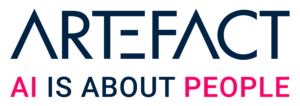AI for Industry Summit by Artefact - September 17th, 2024 - Paris
Key learnings from the keynote by Milton Martinez Luaces, Vice-President of Data – Value Chain at Decathlon.
Decathlon’s value chain and digital organization
Instead of referring to it as the supply chain, Decathlon uses the term “value chain” to emphasize the customer-focused approach. This covers everything from production, transport, and logistics to the end-to-end supply process. Decathlon’s digital unit, which leads the AI initiatives, is structured into four key areas: business, engineering, product, and data. The speaker, representing the data aspect, explained that the team includes over 600 engineers and 140 data scientists, reflecting the vast scope of their operations.
AI’s role in improving customer experience
One of the core goals for AI at Decathlon is improving the customer experience by addressing rising expectations for customization and fast delivery times. In markets like Singapore and India, Decathlon already delivers e-commerce orders within 2 to 6 hours, setting high standards that challenge their European operations to match. AI is crucial in areas such as forecasting, inventory management, and assortment planning, ensuring that Decathlon can meet customer expectations for availability and fast delivery.
Innovation through AI and research
Another major objective of Decathlon’s AI strategy is innovation. The company balances delivering AI solutions for internal clients with investing in research and development. This includes initiatives like AI hackathons and partnerships with universities in France and Singapore to explore new AI applications. Innovation is key to ensuring Decathlon stays competitive, and AI helps optimize its supply chain processes through predictive algorithms and machine learning.
AI explainability and human integration
One of the challenges Decathlon faces with AI adoption is making AI decisions more understandable for the business teams. The speaker acknowledged that the “black box” nature of AI often creates resistance due to its lack of transparency. To address this, Decathlon is working on providing AI explainability, aiming to turn the black box into a “gray box” so that users can see some of the reasoning behind AI decisions. This approach is critical for integrating AI into industrial processes and gaining the trust of staff who can then focus on strategic tasks rather than manual calculations.
AI applications in forecasting and traceability
AI plays a vital role in Decathlon’s supply chain, especially in areas like forecasting demand and managing product flows. A team of 40 people focuses on demand forecasting across various levels, from e-commerce to regional warehouses. Additionally, AI helps solve challenges like the “cold start” problem, where new products with no sales history are introduced, making predictions difficult. AI-driven solutions are being developed to forecast demand even for entirely new product families.
Sustainability and AI in Decathlon’s operations
The company has implemented AI solutions for energy consumption monitoring, anomaly detection, and prediction across its operations. Future plans include extending these efforts to cover water consumption, carbon footprints, and compliance with EU regulations. By using AI to manage sustainability data, Decathlon is able to track and reduce environmental impact throughout its supply chain.
Supplier risk management with AI
With global supply chains becoming increasingly complex, Decathlon uses AI to score and evaluate risks, including geopolitical factors and disruptions. Generative AI helps capture insights from news sources, generating machine learning models to assess risk and optimize sourcing strategies. The goal is to achieve “right-shoring,” a balance between price, lead time, CO2 emissions, and supply chain risk, ensuring Decathlon can maintain resilient and sustainable operations.

 BLOG
BLOG



